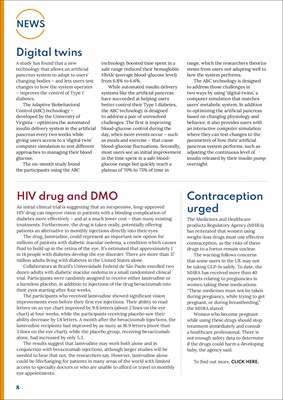
8
NEWS
HIV drug and DMO
An initial clinical trial is suggesting that an inexpensive, long-approved
HIV drug can improve vision in patients with a blinding complication of
diabetes more effectively - and at a much lower cost - than many existing
treatments. Furthermore, the drug is taken orally, potentially offering
patients an alternative to monthly injections directly into their eyes.
The drug, lamivudine, could represent an important new option for
millions of patients with diabetic macular oedema, a condition which causes
fluid to build up in the retina of the eye. It's estimated that approximately 1
in 14 people with diabetes develop the eye disorder. There are more than 37
million adults living with diabetes in the United States alone.
Collaborators at Brazil's Universidade Federal de São Paulo enrolled two
dozen adults with diabetic macular oedema in a small randomized clinical
trial. Participants were randomly assigned to receive either lamivudine or
a harmless placebo, in addition to injections of the drug bevacizumab into
their eyes starting after four weeks.
The participants who received lamivudine showed significant vision
improvements even before their first eye injections. Their ability to read
letters on an eye chart improved by 9.8 letters (about 2 lines on the eye
chart) at four weeks, while the participants receiving placebo saw their
ability decrease by 1.8 letters. A month after the bevacizumab injections, the
lamivudine recipients had improved by as many as 16.9 letters (more than
3 lines on the eye chart), while the placebo group, receiving bevacizumab
alone, had increased by only 5.3.
The results suggest that lamivudine may work both alone and in
conjunction with bevacizumab injections, although larger studies will be
needed to bear that out, the researchers say. However, lamivudine alone
could be lifechanging for patients in many areas of the world with limited
access to specialty doctors or who are unable to afford or travel to monthly
eye appointments.
Digital twins
A study has found that a new
technology that allows an artificial
pancreas system to adapt to users'
changing bodies - and lets users test
changes to how the system operates
- improves the control of Type 1
diabetes.
The Adaptive Biobehavioral
Control (ABC) technology -
developed by the University of
Virginia - optimizes the automated
insulin delivery system in the artificial
pancreas every two weeks while
giving users access to a 'digital twin'
computer simulation to test different
approaches to managing their blood
glucose.
The six-month study found
the participants using the ABC
technology boosted time spent in a
safe range reduced their hemoglobin
HbA1c (average blood-glucose level)
from 6.8% to 6.6%.
While automated insulin delivery
systems like the artificial pancreas
have succeeded at helping users
better control their Type 1 diabetes,
the ABC technology is designed
to address a pair of unresolved
challenges. The first is improving
blood-glucose control during the
day, when more events occur - such
as meals and exercise - that cause
blood-glucose fluctuations. Secondly,
most users see an initial improvement
in the time spent in a safe bloodglucose
range but quickly reach a
plateau of 70% to 75% of time in
range, which the researchers theorize
stems from users not adapting well to
how the system performs.
The ABC technology is designed
to address those challenges in
two ways by using 'digital twins,' a
computer simulation that matches
users' metabolic system. In addition
to optimizing the artificial pancreas
based on changing physiology and
behavior, it also provides users with
an interactive computer simulation
where they can test changes to the
parameters of how their artificial
pancreas system performs, such as
adjusting the continuous level of
insulin released by their insulin pump
overnight.
Contraception
urged
The Medicines and Healthcare
products Regulatory Agency (MHRA)
has reiterated that women using
weight-loss drugs must use effective
contraception, as the risks of these
drugs to a foetus remain unclear.
The warning follows concerns
that some users in the UK may not
be taking GLP-1s safely. To date, the
MHRA has received more than 40
reports relating to pregnancies in
women taking these medications.
"These medicines must not be taken
during pregnancy, while trying to get
pregnant, or during breastfeeding,"
the MHRA stated.
Women who become pregnant
while using these drugs should stop
treatment immediately and consult
a healthcare professional. There is
not enough safety data to determine
if the drugs could harm a developing
baby, the agency said.
To find out more, CLICK HERE.